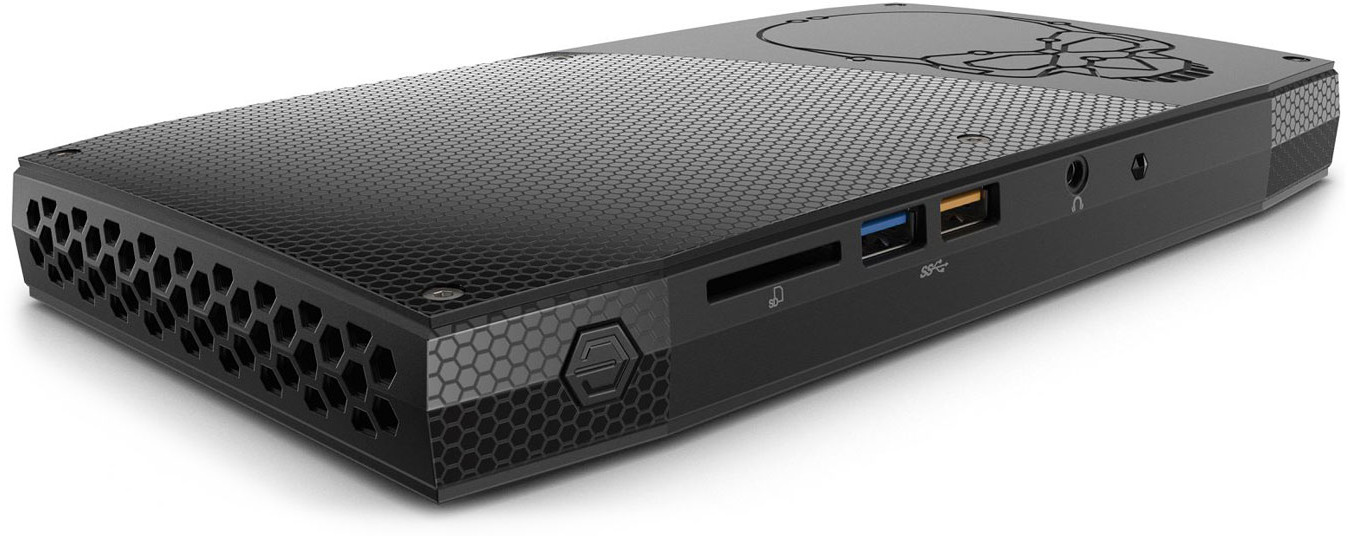Notes on setting up Ubuntu 18.04 LTS (Bionic Beaver) on Intel NUC6i7KYK tech-spec [PDF]
- Intel NUC6i7KYK - 6th generation Intel® Core™ i7-6770HQ processor with Intel® Iris™ Pro graphics (2.6 to 3.5 GHz Turbo, Quad Core, 6 MB Cache, 45W TDP).
- 970 EVO NVMe M.2 SSD - 250Gb, NVMe SSD powered by Samsung V-NAND technology. Up to 3,500MB/s sequential read and 2,500MB/s write.
- Komputerbay 32GB ( 2x 16GB) SODIMM - Laptop Memory Upgrade DDR4 2400MHz PC4-19200 SODIMM 2Rx8 CL16 1.2v Notebook RAM.
- Microsoft All-in-One Media Keyboard.
Dowfnload 64-bit desktop ISO image (1.5Gb) from http://old-releases.ubuntu.com/releases/bionic/ and use Startup Disk Creator to burn to a USB drive.
BIOS & firmware updates available from: https://downloadcenter.intel.com/product/89187/Intel-NUC-Kit-NUC6i7KYK
Enabling fast boot means that there is no straightforward way to get to the BIOS settings, as the splash screen with F2 / F7 / etc options is skipped entirely. With the machine powered off, press and hold the power button for 3-4 seconds then release. You should see a menu appear listing various options, one of which is BIOS Setup (press F2).
The power LED on the Intel® NUC blinks in a pattern if an error occurs during POST. Intel NUC products that include a front panel audio jack produce an audible beep pattern that you can hear through headphones or speakers plugged into that jack.
| Code | Diagnosis | Pattern |
|---|---|---|
| 3 blinks (3 beeps) | Memory error | On-off (1.0 second each) three times, then 2.5-second pause (off). The pattern repeats until the computer is powered off. Some memory sticks, while supported by hardware spec, can still cause issues. Some errors can be fixed by removing one stick if two are installed. A non complete list of supported RAM can be found here. |
| Continual blinks | BIOS Update in progress | Off when the update starts, then on for 0.5 seconds, then off for 0.5 seconds. The pattern repeats until the BIOS update is complete. |
| 2 blinks (2 beeps) | Video error (when no VGA option ROM is found) | On-off (1.0 second each) two times, then 2.5-second pause (off). The pattern repeats until the computer is powered off. |
| 16 on/off blinks (8 beeps) | CPU thermal trip warning | 0.25 seconds on, 0.25 seconds off, 0.25 seconds on, 0.25 seconds off, for a total of 16 blinks. Then the computer shuts down. |
BIOS KYSKLi70.86A.0060.2019.0122.1440 installed.
showkey displays the key mappings and keytouch-editor allows custom key mappings to be created.
- http://unix.stackexchange.com/questions/198715/media-key-problems-with-microsoft-keyboard
- http://unix.stackexchange.com/questions/227264/is-it-possible-to-tweak-input-from-touchpad
- http://askubuntu.com/questions/363346/how-to-permanently-switch-caps-lock-and-esc
On Installation type screen, don't pick 'Encrypt the new Ubuntu installation for security': Use home folders encryption instead.
Alter /etc/fstab to set the root partition options to include noatime.
Remount with sudo mount -o remount / (does not need a reboot).
Add the following line to the /etc/sysctl.conf file:
fs.inotify.max_user_watches = 524288
Then run this command to apply the change:
$ sudo sysctl -p --system
- Terminal size: 80 x 43
- Custom font: Monospace Regular 10
- Colors: Grey on black
- Use transparent background: 10%
- Limit scrollback: Unlimited
Generate an RSA public/private keypair with ssh-keygen. Upload the public key
to github, and add to https://github.com/rm-hull/dotfiles/blob/master/.ssh/authorized_keys
From a command prompt:
$ sudo apt-get install git
$ git clone git@github.com:rm-hull/dotfiles.git
$ cd dotfiles
$ ./bootstrap.sh
Answer 'y' when prompted.
Copy ~/.apt-lists/* into /etc/apt/sources.list.d as root, and trust the keys:
$ sudo cp -av ~/.apt-lists/*.list /etc/apt/sources.list.d
$ sudo apt-key add ~/.apt-lists/TRUSTED-KEYS.txt
(trusted keys generated with apt-key exportall)
Install some common packages from the Ubuntu mines:
$ sudo apt install git htop tree nfs-client sshfs gimp openssh-server \
exuberant-ctags silversearcher-ag postgresql postgresql-client \
openvpn network-manager-openvpn network-manager-openvpn-gnome \
optipng p7zip unrar mplayer ffmpeg gitg conky-all acpi vim-gtk \
ttf-mscorefonts-installer httpie jq awscli python-pip python3-pip \
curl net-tools wireshark-qt libcanberra-gtk-module libcanberra-gtk3-module \
slurm moreutils ncdu inxi graphviz gnome-tweaks sbcl ngrep speedtest-cli \
nethogs linux-tools-common linux-tools-generic linux-cloud-tools-generic \
rlwrap iperf libreadline-dev sqlite3 libsqlite3-dev build-essential \
libssl-dev zlib1g-dev libbz2-dev llvm libncurses5-dev libncursesw5-dev \
xz-utils tk-dev libffi-dev liblzma-dev python-openssl python3-dev \
libsdl-image1.2-dev libsdl-mixer1.2-dev libsdl-ttf2.0-dev libsdl1.2-dev \
libsmpeg-dev python-numpy libportmidi-dev ffmpeg libswscale-dev \
libavformat-dev libavcodec-dev python3-pil libjpeg-dev zlib1g-dev \
libfreetype6-dev liblcms2-dev libopenjp2-7 libtiff5
Next install some packages from other sources:
$ sudo apt install virtualbox-6.1 oracle-java12-installer \
oracle-java12-set-default google-chrome-stable nodejs sbt \
docker-ce etcher-electron code
$ sudo groupadd docker
$ sudo usermod -aG docker $USER
Log out and in again to pick up the new group
Create a mount point with sudo mkdir -p /mnt/atrax and add the following
entry to /etc/fstab:
192.168.1.65:/ /mnt/atrax nfs4 _netdev,auto,intr,timeo=14,x-systemd.device-timeout=3s,nofail,noatime 0 0
Mount it, and re-assign links:
$ sudo mount /mnt/atrax
$ cd ~
$ rm -rf Documents Music Videos Pictures
$ ln -s /mnt/atrax/users/rhu/Documents
$ ln -s /mnt/atrax/media/Music
$ ln -s /mnt/atrax/media/Photos Pictures
$ ln -s /mnt/atrax/media/Videos
| Device | BogoMIPS |
|---|---|
| Skull Canyon | 41472.00 |
| i7-4700MQ | 38312.84 |
| AMD Ryzen Threadripper 1950X | 217164.73 |
| AMD Turion II Neo N40L | 5990.21 |
Running hdparm -tT /dev/...:
| Device | Drive | Buffered Reads | Cached Reads |
|---|---|---|---|
| Skull Canyon | Samsung 970 EVO M2 | 2478.33 MB/sec | 12689.42 MB/sec |
| i7-4700MQ | Kingson v300 SATA | 308.45 MB/sec | 8916.75 MB/sec |
| HP Proliant Server | WD 7200RPM HDD | 11.10 MB/sec | 1403.80 MB/sec |
| Digital Ocean droplet | Virtualized SSD | 270.41 MB/sec | 6461.35 MB/sec |

